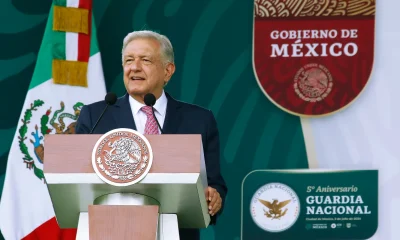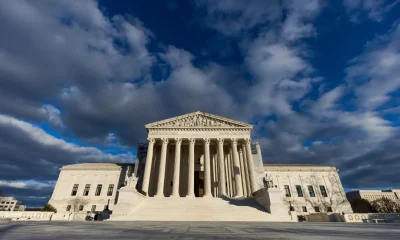International
The United States Supreme Court gives Texas free rein to arrest and expel migrants

The Supreme Court of Justice ruled on Tuesday in favor of the state of Texas allowing it to enter into force of a law that allows the Police to arrest and expel migrants suspected of irregularly entering the United States.
The legislation, known as SB4, may enter into force while the arguments of a lawsuit filed by the Government of President Joe Biden and organizations defending migrants are heard.
The case reached the highest court after a legal battle undertaken by the Biden Administration and advocates of immigrants led by the American Civil Liberties Union (ACLU), who allege that the initiative is unconstitutional.
The plaintiffs had asked the Supreme Court to stop the implementation of the measure while the case was being settled in the Fifth Circuit of Appeals. On Monday, Judge Samuel Alito had blocked the law indefinitely, waiting for the plenary to vote on this request.
On Tuesday, the six conservative judges voted in favor of Texas, allowing the law to take effect while a final ruling is given in the case.
Texas Attorney General Ken Paxton applauded the high court’s decision in a message in X. “Texas has defeated the emergency motions of the Biden Administration and the ACLU,” and stressed that the law is already in force.
The law, one of the most drastic anti-immigrant measures in the history of the United States, makes it a misdemeanor that a foreigner “enters or attempts to enter the state from a foreign nation” irregularly. The offense becomes a serious crime, punishable by up to 20 years in prison, if the offender is a repeat offender.
The initiative also allows the state Justice to order the expulsion of people without legal process. Likewise, police officers will be able to arrest any individual they suspect that he entered the country illegally, and will have the discretionary power to expel him to Mexico instead of arresting him.
Initially, the measure promoted by the governor of Texas, Republican Greg Abbott, was supposed to enter into force on March 5, but a federal judge sided with the plaintiffs and banned it.
The Texas prosecutor, Ken Paxton, took the fight to the Fifth Circuit of Appeals where he obtained support, so the plaintiffs went to the Supreme Court to prevent the law from entering into force asking for an emergency motion, which was finally denied.
Anand Balakrishnan, lead lawyer of the ACLU Immigrant Rights Project, described Tuesday’s decision as “disappointing.”
The lawyer added in a statement that the law “threatens the integrity of our nation’s immigration laws and the fundamental principles of due process” so they will continue to fight until they defeat it.
International
Claudia Sheinbaum: Operation Against ‘El Mencho’ Was Based on Pending Arrest Warrants

Mexico’s President Claudia Sheinbaum on Wednesday rejected claims that the military operation that resulted in the death of Nemesio Oseguera Cervantes, known as “El Mencho,” leader of the Jalisco New Generation Cartel (CJNG), was carried out under pressure from the United States government.
Sheinbaum explained that the deployment of federal forces was aimed at executing outstanding arrest warrants against Oseguera Cervantes, who was considered one of the most wanted criminals in both Mexico and the United States.
“That was not the objective (to ease pressure from the United States). It is very important, and I want to repeat it. This individual had an arrest warrant, or several,” Sheinbaum said, referring to the operation conducted on February 22.
According to the president, the initial goal was to capture Oseguera Cervantes, but military forces responded after coming under attack during the intervention.
“The operation was to detain him. The problem is that they were attacked — the Secretariat of National Defense — and they responded at that moment,” she said.
The president insisted that the action was not carried out in response to external demands, although she acknowledged intelligence cooperation with the United States.
“It was not done in any way because of pressure from the United States, not at all. Of course, there was intelligence information from the United States that was used specifically,” she concluded.
International
Spain Denies Any Agreement to Cooperate with U.S. Military in Iran Operations
International
White House Says Spain Agrees to Cooperate with U.S. Military After Trump Threatens Trade Embargo

White House Press Secretary Karoline Leavitt said Wednesday that Spain has agreed “in recent hours” to cooperate with the U.S. military, following President Donald Trump’s threat to impose a trade embargo on Madrid.
Trump had warned of potential commercial measures after Spain reportedly refused to allow the Pentagon to use facilities at Spanish military bases for operations related to Iran.
“With respect to Spain, I think you heard the president’s message yesterday loud and clear, and I understand that in recent hours they have agreed to cooperate with the United States military,” Leavitt said during a press briefing.
She added that the U.S. military is currently coordinating with its counterparts in Spain. However, the president expects broader support.
“The president expects that all of Europe, all of our European allies, of course, will cooperate in this important mission — not only for the United States, but also for Europe,” Leavitt said.
Her remarks came in response to questions about Spain’s position and its role as a U.S. ally amid rising tensions surrounding operations involving Iran.
-

 International4 days ago
International4 days agoIran Reports 201 Dead, 747 Injured After U.S. and Israeli Strikes
-

 International3 days ago
International3 days agoBrazil’s Supreme Court Rejects Bolsonaro’s Bid for House Arrest
-

 International3 days ago
International3 days agoAnti-ICE Billboard Campaign Targets Immigration Spending in 31 U.S. Cities
-

 International2 days ago
International2 days agoSpain’s Prime Minister to Address Nation Amid Trump’s Trade Threats
-

 International4 days ago
International4 days agoPope Leo XIV Urges End to ‘Spiral of Violence’ in Middle East
-

 International1 day ago
International1 day agoWhite House Says Spain Agrees to Cooperate with U.S. Military After Trump Threatens Trade Embargo
-

 International3 days ago
International3 days agoTrump Warns of ‘Major Wave’ of Attacks as Iran Conflict Escalates
-

 International3 days ago
International3 days agoMexico Calls for Immediate Probe After National Dies in ICE Custody
-

 International2 days ago
International2 days agoNew York Announces First 2,000 Seats in Universal 2-K Program
-

 International1 day ago
International1 day agoSpain Denies Any Agreement to Cooperate with U.S. Military in Iran Operations
-

 Central America2 days ago
Central America2 days agoGuatemala’s Attorney General Fails in Bid for Top Court Seat Amid Corruption Allegations
-

 Central America1 day ago
Central America1 day agoNicaragua Held Responsible for Harassment of Opposition Prosecutor and His Family
-

 Central America3 days ago
Central America3 days agoPanama Canal Monitoring Trade as Middle East Conflict Disrupts Shipping
-

 International3 days ago
International3 days agoBolivia Orders Three Investigations Into Deadly Military Plane Crash
-

 International2 days ago
International2 days agoWarner Bros. Developing First ‘Game of Thrones’ Movie With ‘Andor’ Writer
-

 International1 day ago
International1 day agoClaudia Sheinbaum: Operation Against ‘El Mencho’ Was Based on Pending Arrest Warrants

























































